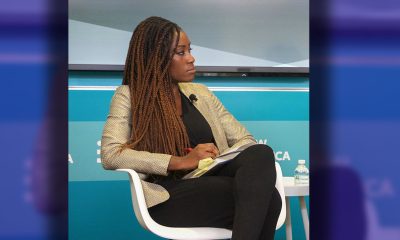Uncategorized
FCC vota para reducir los costos de Llamadas de la prisión
Por Jana Kasperkevic, The Guardian
Los reguladores federales actuaron para limitar los costos de las llamadas telefónicas de la prisión el jueves en un intento de poner fin a un sistema que ha impulsado el precio de una llamada de hasta $17 por minuto.
<p>
En una reunión en Washington de la Comisión Federal de Comunicaciones (FCC) votó a favor de limitar las tasas de llamadas de reclusos hechas de un estado a otro. Las llamadas de prisiones han sido impulsadas por las nubes por los honorarios cobrados por las compañías telefónicas, las comisiones y tarifas cobradas por las prisiones para controlar las llamadas y para otros servicios.
Una comisionada de la FCC, Mignon Clyburn, dijo que Estados Unidos tiene “la distinción lamentable de [tener] la tasa de encarcelamiento más alta de la palabra”. Ella citó a Nelson Mandela diciendo que nadie conoce una nación hasta que uno ha estado dentro de sus cárceles.
“El encarcelamiento es un asunto de familia, un asunto económico, un asunto social. El mayor impacto de la sentencia de un preso es a menudo en los seres queridos que quedaron atrás “, dijo Clyburn.
Clyburn, demócrata, ha sido una firme defensora de dicha reforma y ha hecho que sea una de las principales prioridades durante su mandato. Y agregó: “Estoy muy orgullosa de que la FCC está finalmente actuando en nombre de los 2,7 millones de niños que han estado sufriendo injustamente y lo más a menudo en silencio. No más excusas. No más justificación para la inacción”.
La comisionada dijo que la familia de un preso ha gastado más de $28.000 en los últimos 10 años para mantenerse en contacto con él.
Los cortes seguirán una estructura de tarifas escalonadas. Llamadas débito y de prepago en estatales o federales prisiones, donde el 71% de los internos residen, costarán 11 centavos por minuto. Las llamadas en las cárceles con 1.000 o más reclusos tendrán un costo de 14 centavos por minuto. Las llamadas en las cárceles con 350 a 999 reclusos tendrán un costo de 16 centavos de dólar por minuto. En las cárceles con menos de 350 reclusos, las llamadas costarán 22 centavos por minuto.
Grupos de derechos de la prisión han argumentado que la comunicación regular ayuda a promover rehabilitaciones y que el mantener a los internos conectados a sus comunidades y familias ayuda a reducir la reincidencia.
“Siete mil reclusos son liberados cada año, y muchos de ellos regresaron a las comunidades como extraños”, dijo Clyburn. “Ellos tienen menos probabilidades de éxito reasimilando y son más propensos caer de nuevo en las cárceles, ya que los estudios estiman que sólo el 38% son capaces de mantener un contacto regular mensual.”
Hacer visitas periódicas a la cárcel es caro y consume demasiado tiempo, la Comisionada Jessica Rosenworcel señaló.
“Las llamadas telefónicas suelen ser la única manera de mantenerse conectados. Cuando el precio de una sola llamada de teléfono puede ser tanto como cualquiera de lo que pagamos cada mes para los planes mensuales sin límite, es difícil mantenerse en contacto”, dijo.
Las nuevas tarifas entrarán en vigor 90 días después de su publicación en el Registro Federal en las prisiones y seis meses después de su publicación en el Registro Federal en las cárceles.
Uncategorized
Oakland Housing and Community Development Department Awards $80.5 Million to Affordable Housing Developments
Special to The Post
The City of Oakland’s Housing and Community Development Department (Oakland HCD) announced its awardees for the 2024-2025 New Construction of Multifamily Affordable Housing Notice of Funding Availability (New Construction NOFA) today Five permanently affordable housing developments received awards out of 24 applications received by the Department, with award amounts ranging from $7 million to $28 million.
In a statement released on Jan. 16, Oakland’s HCD stated, “Five New Construction Multifamily Affordable Housing Development projects awarded a total of $80.5 million to develop 583 affordable rental homes throughout Oakland. Awardees will leverage the City’s investments to apply for funding from the state and private entities.”
In December, the office of Rebecca Kaplan, interim District 2 City Councilmember, worked with HCD to allocate an additional $10 Million from Measure U to the funding pool. The legislation also readopted various capital improvement projects including street paving and upgrades to public facilities.
The following Oakland affordable housing developments have been awarded in the current round:
Mandela Station Affordable
- 238 Affordable Units including 60 dedicated for Homeless/Special Needs
- Award: $15 million + previously awarded $18 million
- Developer: Mandela Station LP (Pacific West Communities, Inc. and Strategic Urban Development Alliance, LLC)
- City Council District: 3
- Address: 1451 7th St.
Liberation Park Residences
- 118 Affordable Units including 30 dedicated for Homeless/Special Needs
- Award: $28 million
- Developer: Eden Housing and Black Cultural Zone
- City Council District: 6
- Address: 7101 Foothill Blvd.
34th & San Pablo
- 59 Affordable Units including 30 dedicated for Homeless/Special Needs
- Award: $7 million
- Developer: 34SP Development LP (EBALDC)
- City Council District: 3
- Address: 3419-3431 San Pablo Ave.
The Eliza
- 96 Affordable Units including 20 dedicated for Homeless/Special Needs
- Award: $20 million
- Developer: Mercy Housing California
- City Council District: 3
- Address: 2125 Telegraph Ave.
3135 San Pablo
- 72 Affordable Units including 36 dedicated for Homeless/Special Needs
- Award: $10.5 million
- Developer: SAHA and St. Mary’s Center
- City Council District: 3
- Address: 3515 San Pablo Ave.
The source of this story is the media reltations office of District 2 City Councilmember Rebecca Kaplan.
Activism
Oakland Housing and Community Development Department Awards $80.5 Million to Affordable Housing Developments
In a statement released on Jan. 16, Oakland’s HCD stated, “Five New Construction Multifamily Affordable Housing Development projects awarded a total of $80.5 million to develop 583 affordable rental homes throughout Oakland. Awardees will leverage the City’s investments to apply for funding from the state and private entities.”

Special to The Post
The City of Oakland’s Housing and Community Development Department (Oakland HCD) announced its awardees for the 2024-2025 New Construction of Multifamily Affordable Housing Notice of Funding Availability (New Construction NOFA) today Five permanently affordable housing developments received awards out of 24 applications received by the Department, with award amounts ranging from $7 million to $28 million.
In a statement released on Jan. 16, Oakland’s HCD stated, “Five New Construction Multifamily Affordable Housing Development projects awarded a total of $80.5 million to develop 583 affordable rental homes throughout Oakland. Awardees will leverage the City’s investments to apply for funding from the state and private entities.”
In December, the office of Rebecca Kaplan, interim District 2 City Councilmember, worked with HCD to allocate an additional $10 Million from Measure U to the funding pool. The legislation also readopted various capital improvement projects including street paving and upgrades to public facilities.
The following Oakland affordable housing developments have been awarded in the current round:
Mandela Station Affordable
- 238 Affordable Units including 60 dedicated for Homeless/Special Needs
- Award: $15 million + previously awarded $18 million
- Developer: Mandela Station LP (Pacific West Communities, Inc. and Strategic Urban Development Alliance, LLC)
- City Council District: 3
- Address: 1451 7th St.
Liberation Park Residences
- 118 Affordable Units including 30 dedicated for Homeless/Special Needs
- Award: $28 million
- Developer: Eden Housing and Black Cultural Zone
- City Council District: 6
- Address: 7101 Foothill Blvd.
34th & San Pablo
- 59 Affordable Units including 30 dedicated for Homeless/Special Needs
- Award: $7 million
- Developer: 34SP Development LP (EBALDC)
- City Council District: 3
- Address: 3419-3431 San Pablo Ave.
The Eliza
- 96 Affordable Units, including 20 dedicated for Homeless/Special Needs
- Award: $20 million
- Developer: Mercy Housing California
- City Council District: 3
- Address: 2125 Telegraph Ave.
3135 San Pablo
- 72 Affordable Units including 36 dedicated for Homeless/Special Needs
- Award: $10.5 million
- Developer: SAHA and St. Mary’s Center
- City Council District: 3
- Address: 3515 San Pablo Ave.
The source of this story is media reltations office of District 2 City Councilmember Rebecca Kaplan.
Alameda County
Oakland Acquisition Company’s Acquisition of County’s Interest in Coliseum Property on the Verge of Completion
The Board of Supervisors is committed to closing the deal expeditiously, and County staff have worked tirelessly to move the deal forward on mutually agreeable terms. The parties are down to the final details and, with the cooperation of OAC and Coliseum Way Partners, LLC, the Board will take a public vote at an upcoming meeting to seal this transaction.

Special to The Post
The County of Alameda announced this week that a deal allowing the Oakland Acquisition Company, LLC, (“OAC”) to acquire the County’s 50% undivided interest in the Oakland- Alameda County Coliseum complex is in the final stages of completion.
The Board of Supervisors is committed to closing the deal expeditiously, and County staff have worked tirelessly to move the deal forward on mutually agreeable terms. The parties are down to the final details and, with the cooperation of OAC and Coliseum Way Partners, LLC, the Board will take a public vote at an upcoming meeting to seal this transaction.
Oakland has already finalized a purchase and sale agreement with OAC for its interest in the property. OAC’s acquisition of the County’s property interest will achieve two longstanding goals of the County:
- The Oakland-Alameda Coliseum complex will finally be under the control of a sole owner with capacity to make unilateral decisions regarding the property; and
- The County will be out of the sports and entertainment business, free to focus and rededicate resources to its core safety net
In an October 2024 press release from the City of Oakland, the former Oakland mayor described the sale of its 50% interest in the property as an “historic achievement” stating that the transaction will “continue to pay dividends for generations to come.”
The Board of Supervisors is pleased to facilitate single-entity ownership of this property uniquely centered in a corridor of East Oakland that has amazing potential.
“The County is committed to bringing its negotiations with OAC to a close,” said Board President David Haubert.
-

 Activism4 weeks ago
Activism4 weeks agoOakland Post: Week of November 19 – 25, 2025
-

 #NNPA BlackPress3 weeks ago
#NNPA BlackPress3 weeks agoLIHEAP Funds Released After Weeks of Delay as States and the District Rush to Protect Households from the Cold
-

 Alameda County3 weeks ago
Alameda County3 weeks agoSeth Curry Makes Impressive Debut with the Golden State Warriors
-

 Activism3 weeks ago
Activism3 weeks agoOakland Post: Week of November 26 – December 2, 2025
-

 #NNPA BlackPress3 weeks ago
#NNPA BlackPress3 weeks agoSeven Steps to Help Your Child Build Meaningful Connections
-

 #NNPA BlackPress4 weeks ago
#NNPA BlackPress4 weeks agoBeyoncé and Jay-Z make rare public appearance with Lewis Hamilton at Las Vegas Grand Prix
-

 #NNPA BlackPress3 weeks ago
#NNPA BlackPress3 weeks agoSeven Steps to Help Your Child Build Meaningful Connections
-

 #NNPA BlackPress3 weeks ago
#NNPA BlackPress3 weeks agoTrinidad and Tobago – Prime Minister Confirms U.S. Marines Working on Tobago Radar System





















































